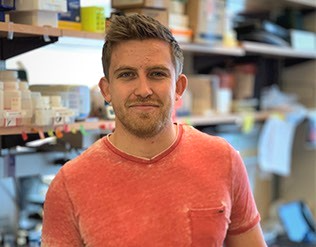Mining the Microbiome 2022: Journal of Medical Microbiology Outstanding Science Prize winners
Rebecca McHugh: Repurposing the bacterial secondary metabolite aurodox as an anti-virulence treatment for enterohemorrhagic E. coli (EHEC).
Who or what inspired you to be a scientist?
My chemistry teacher in my first year of high school, Mr Bowman. He told me I was going to be a scientist one day, I didn’t believe him… here we are!
What are you currently working on and what area of your research excites you the most?
I am currently working on novel therapies for E. coli infections of the gut. I am really excited by alternatives to antibiotics.
How would you explain your poster to a child under 10?
When you get a tummy bug, the antibiotic pills we get from the doctor aren’t always the best treatment. I’m trying to find new pills for tummy bugs that work better than the ones we have now.
What would you be doing in your career if you weren’t a scientist?
I would love to be a travel agent. I love organising trips for myself and others.
Alfie O’Sullivan: Airway exposure to Staphylococcus aureus is protective in a model of allergic asthma

Who or what inspired you to be a scientist?
My biology teacher was a big reason why I loved science in school and why I still love it today. We were always doing interesting things in class which made learning more fun, for example using a cake and sweets to ‘construct’ a plant cell and the various organelles. Biology was the one subject that never felt like work for me.
What are you currently working on and what area of your research excites you the most?
Currently I am examining how respiratory bacteria can affect allergic sensitisation and asthma. The area of research I’m most excited about is how certain respiratory tract species can confer protection in allergic airway disease but can do so through a range of immunomodulatory mechanisms.
How would you explain your poster to a child under 10?
People who have asthma can find it more difficult to breathe than other people. My poster is showing how bacteria, which are very small living things that live in and on us, can maybe help people with asthma feel less sick by making sure their lungs don’t overact to certain things they breathe in.
What would you be doing in your career if you weren’t a scientist?
I think if I didn’t become a scientist, I would have become an accountant. I liked how methodical and systematic accountancy was, but it certainly wouldn’t have been as interesting to me as a career in science!
